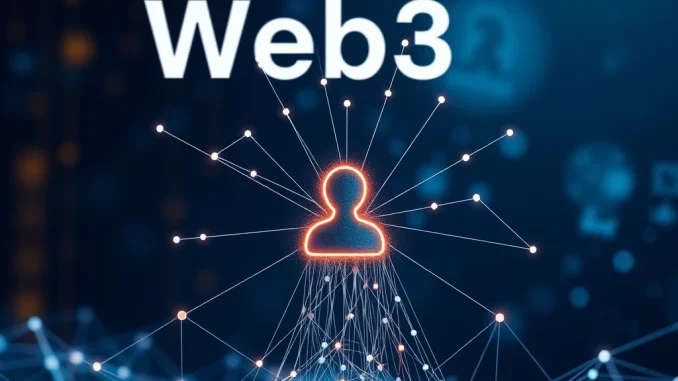
Exciting news is circulating in the decentralized world! Shards Protocol, a project focused on building a crucial layer for the internet’s next evolution, has successfully raised significant capital. This recent Crypto Funding round brings $2 million into their development efforts, aiming to accelerate their work on a core piece of infrastructure: Web3 Identity.
What is Shards Protocol and Why Does Web3 Identity Matter?
Shards Protocol is developing tools and protocols designed to give users a persistent, verifiable identity rooted in their activities within decentralized networks. Unlike traditional web services where platforms control user data and identity, Web3 aims for self-sovereignty. A robust identity layer is essential for this vision to function effectively.
Think about it: How do you build trust, enable personalized experiences, or even manage governance in a decentralized system without knowing something about the participants? This is where Web3 Identity comes into play. It allows for reputation building, access control, and a more nuanced interaction model beyond just wallet addresses.
Introducing the Aura Protocol: Building On-Chain Reputation
At the heart of Shards Protocol’s offering is its flagship product, the Aura Protocol. Aura is designed to translate a user’s on-chain actions and history into a meaningful reputation score or profile. This isn’t just about tracking transactions; it includes participation in DAOs, contributions to decentralized applications, asset holdings, and other verifiable activities.
Here’s a simple breakdown of the Aura concept:
- Input: Your verifiable activities on various blockchains (DeFi interactions, NFT ownership, governance votes, etc.).
- Processing: The Aura Protocol analyzes and weights these activities based on predefined criteria.
- Output: A dynamic reputation profile or score linked to your Web3 identity.
This on-chain reputation can then be used across the Web3 ecosystem to unlock various benefits and opportunities.
Who is Backing This Web3 Identity Push?
The $2 million raised by Shards Protocol comes from a strong group of investors prominent in the blockchain and gaming space. Key backers include:
- Animoca Brands
- Yield Guild Games (YGG)
- Kyber Ventures
- And others…
Securing Crypto Funding from such established names signals confidence in Shards Protocol’s vision and the potential of the Aura Protocol to become a foundational piece of Web3 infrastructure. These investors bring not just capital but also strategic connections within the gaming, DeFi, and broader Web3 communities.
Over 1 Million Users Already? What Does That Mean?
Shards Protocol reports having over 1 million users across its existing products. While the specific breakdown across different offerings isn’t detailed in the announcement, this significant user base suggests a strong existing community and a proven ability to attract users within the Web3 space. This provides a solid foundation for the further rollout and adoption of the Aura Protocol and its On-Chain Reputation features.
Future Plans: Expansion and Token Launch
With the new funding, Shards Protocol has clear plans for the future. The primary focus is on expanding the features and capabilities of the Aura Protocol. This likely involves integrating more types of on-chain data, improving the reputation scoring mechanisms, and building tools for other protocols and applications to easily utilize Aura profiles.
Perhaps the most anticipated development mentioned is the planned token launch later this year. A native protocol token could serve multiple purposes:
- Governance: Allowing token holders to participate in the future direction of Shards Protocol and the Aura Protocol.
- Utility: Potentially used for accessing premium features, paying for services, or incentivizing participation.
- Rewards: Distributed to users who build strong On-Chain Reputation through the Aura Protocol.
The token launch will be a key event for the project, potentially expanding its reach and decentralizing control over time.
How Might On-Chain Reputation Be Used in Practice?
The concept of On-Chain Reputation powered by the Aura Protocol opens up numerous possibilities within the Web3 ecosystem. Here are a few examples:
| Area | Potential Use Case |
|---|---|
| DeFi | Undercollateralized loans based on proven reliability; personalized interest rates. |
| DAOs | Weighted voting power based on participation history; access to exclusive governance proposals. |
| NFTs & Gaming | Access to exclusive drops or in-game items; matchmaking based on reputation or skill indicators. |
| Communities | Entry into token-gated communities based on verifiable contributions; recognition for valuable members. |
| Airdrops | Targeted airdrops to active and reputable users, reducing Sybil attacks. |
These are just a few ways a robust Web3 Identity layer with verifiable reputation can enhance functionality, trust, and engagement across decentralized applications.
The Road Ahead for Shards Protocol
While the $2 million funding is a significant milestone, building a widely adopted Web3 Identity layer like the Aura Protocol is a complex undertaking. Challenges include ensuring interoperability across different chains, maintaining user privacy while leveraging public data, and achieving broad adoption across the diverse Web3 landscape.
However, the potential rewards are substantial. A successful On-Chain Reputation system can unlock new economic models, improve user experiences, and foster more mature and trustworthy decentralized communities.
Conclusion: A Boost for Web3’s Foundation
Shards Protocol’s successful $2 million Crypto Funding round, backed by notable investors, provides a significant boost to their mission. By focusing on the Aura Protocol, they are directly addressing the critical need for a functional Web3 Identity layer and verifiable On-Chain Reputation. With a reported 1 million users already and plans for expansion and a token launch this year, Shards Protocol is positioning itself to play a key role in shaping how users are identified and rewarded in the decentralized future.
This development is one to watch as the Web3 ecosystem continues to mature and seek solutions for identity, trust, and reputation.



